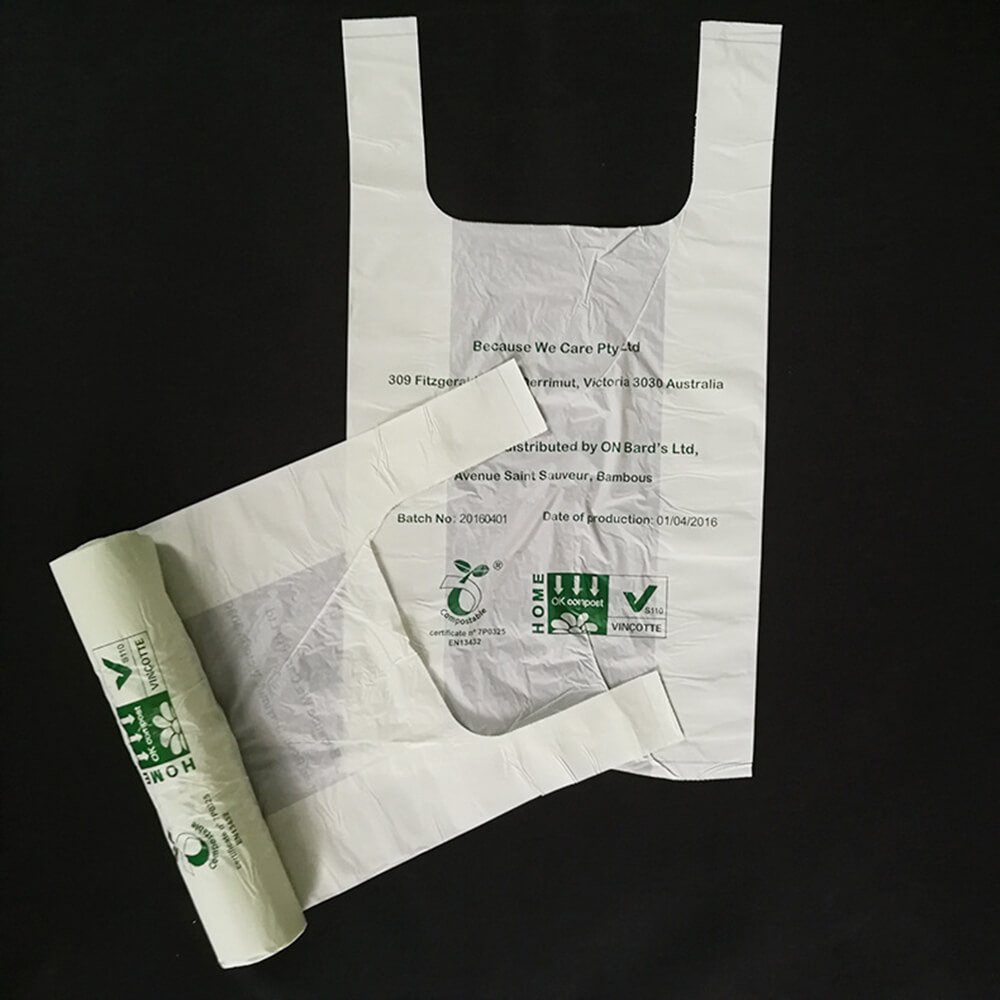

Fully degradable plastic bags will decompose into carbon dioxide, water and other small molecules and exist in nature. And it takes about 180 days for the decomposition to be completed.
01 Extract cornstarch, starch, and other plants as raw materials.
02 After processing, made into biodegradable particles
03 Processed into biodegradable bags through the process of manufacturing
04 Biodegraded under special conditions of high temperature soil
05Compost melts into the environment and becomes fertilizer for plants
06 Organic fertilizers can promote plant growth.
C02, H20, etc. can be decomposed under high temperature, high humidity, microorganisms and other specific environments within 180 days.

Fully biodegradable undershirt bag is the abbreviation of all kinds of biodegradable plastic bags. With the development of science and technology, all kinds of materials that can replace the traditional PE plastic have appeared, including PLA, PHAs, PBA, PBS and other polymer materials.
All can replace the traditional PE plastic bags. Biodegradable undershirt bags have been widely used: supermarket shopping bags, rolled fresh bags, mulch, etc. There are examples of large-scale application in the country. Jilin Province has been the province’s use of PLA (polylactic acid) instead of traditional plastic bags, and achieved better results.
In Sanya City, Hainan Province, starch-based biodegradable plastic bags have also entered the supermarkets and hotels and other industries to use on a large scale.
June 1, 2008 from the implementation of the “plastic restrictions” clearly stipulates that shopping malls, supermarkets and markets shall not provide free plastic shopping bags, and prohibit the use of plastic shopping bags with a thickness of less than 0.025 mm.” After the implementation of the “plastic limit order” has achieved certain results, to a certain extent, to promote the development of environmentally friendly plastic bag industry.
Production of plastic bags added in the process of degradation of the plastic bag called degradation of plastic bags, degradation of plastic bags after 90 days in line with certain conditions can be automatically decomposed.
Plastic film as the raw material for the production of bags collectively referred to as plastic bags, we commonly used plastic bags are: convenience bags, supermarket bags, handbags, flat pockets, plastic bags, bridle straps and industrial bags.
Tested by the National Environmental Protection Product Quality Supervision and Inspection Center, all the indicators of the product have reached or exceeded the national quality standards, and it has the characteristics of hygiene, non-toxic, non-polluting, etc.
It is one of the most advanced environmentally friendly products in China. This biodegradable plastic bags, using non-toxic polyolefin resin, add degradation agent and other raw materials production. Its introduction brings hope for the reduction or elimination of white pollution.
Plastic bags were first invented by a European factory owner in 1902. Because of its convenience and ease of use, low price, and therefore almost ubiquitous. Since the birth of the plastic bag, it is destined to be “ready to use and discard” consumables. Generally speaking, there is no completely environmentally friendly plastic bags, only some plastic bags after adding some ingredients, easy to degrade some.
That is, biodegradable plastics. In the production process of plastic packaging products to add a certain amount of additives (such as starch, modified starch or other cellulose, photosensitizers, biodegradable agents, etc.), so that the stability of the plastic packaging material is reduced, easier to degrade in the natural environment. There are already 19 units developing or producing degradable plastics in Beijing.
Tests have shown that most degradable plastics begin to thin, lose weight, lose strength, and gradually crack into fragments after 3 months of exposure to the general environment. If these fragments are buried in garbage or soil, the degradation effect is not obvious.
The use of biodegradable plastics has four shortcomings: first, more food consumption; second, the use of biodegradable plastic products still can not completely eliminate “visual pollution”; third, due to technical reasons, the use of biodegradable plastic products can not be completely resolved to the environment of “potential hazards”; and fourth, biodegradable plastics are difficult to recycle due to the presence of special additives.

The fully degradable plastic bags of Jcbasic Co., Ltd. have gone through multiple inspections and have rich production experience, which can ensure high quality and efficient production at the same time. At the same time, Jcbasic has remarkable achievements in the field of recovering recyclable bags and biodegradable bags, and it has already obtained international certificates of certification, such as GRS, D2W and so on.

To make it easier for you to receive a quote, simply leave your information, and we will contact you as soon as possible.